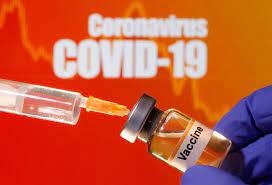
The cost of vaccination of at least 40 per cent of the population in all countries by the end of 2021 and at least 60 per cent by the first half of 2022 could bring an end to the Covid-19 pandemic, according to the International Monetary Fund (IMF) which also set a price tag of $50bn for that purpose.
If that is achieved, it would be equivalent to injecting the equivalent of $9 trillion into the global economy by 2025 because of the speedier resumption of economic activities and the richer countries would be biggest potential benefiters.
The IMF said that the health crisis has so far caused the death of more than 3.5 million people worldwide and the crisis has also projected towards unequal health prospects well into 2022 which can have “severe risks for the world”.
It would be ultimately beneficial for the richer countries to increase donations for global vaccination to that there is a faster end to the pandemic, said IMF Managing Director Kristalina Georgieva while addressing a health summit hosted by the European Commission and Group of 20 (G20) major economies.
“Advanced economies – asked to contribute most to this effort – would likely see the highest return on public investment in modern history, capturing 40 percent of the GDP [gross domestic product] gains and roughly $1 trillion in additional tax revenues,” she said in her prepared remarks.
There are already efforts to assure equal distribution of Covid-19 vaccines in the world such as those by the Access to COVID-19 Tools (ACT) Accelerator, the United Nations, the World Health Organization and other groups and this proposal from the IMF which has been drafted by IMF Chief Economist Gita Gopinath and Senior Economist Ruchir Agarwal is aimed to add on to those efforts.
According to the proposed plan, the IMF urged the rich countries, private and multilateral donors to account for about $35 billion of the $50 billion while the remaining $15 billion is planned to be funded by national governments through low- or no-interest financing options that can be availed from multilateral development banks.
The need for about $22bn in grants to tackle the health crisis has already been identified by the G20 countries which means that about $13 billion of the remaining amount will be needed to be arranged in grants to amass the $50 billion, said the authors of the IMF report.
In addition to investments for diversification and increase of vaccine production capacity globally which will require $8 billion, the financing plan for the IMF also includes upfront financing, vaccine donations and measures so there is completely free cross border flows of vaccine raw materials and finished vaccines.
Even if countries prioritised their own populations, it would be possible to donate only about one billion doses this year, the IMF projected, while an additional one billion doses should be produced by early 2022 to handle downside risks, such as new variants that require booster shots.
(Source:www.aljazeera.com)
If that is achieved, it would be equivalent to injecting the equivalent of $9 trillion into the global economy by 2025 because of the speedier resumption of economic activities and the richer countries would be biggest potential benefiters.
The IMF said that the health crisis has so far caused the death of more than 3.5 million people worldwide and the crisis has also projected towards unequal health prospects well into 2022 which can have “severe risks for the world”.
It would be ultimately beneficial for the richer countries to increase donations for global vaccination to that there is a faster end to the pandemic, said IMF Managing Director Kristalina Georgieva while addressing a health summit hosted by the European Commission and Group of 20 (G20) major economies.
“Advanced economies – asked to contribute most to this effort – would likely see the highest return on public investment in modern history, capturing 40 percent of the GDP [gross domestic product] gains and roughly $1 trillion in additional tax revenues,” she said in her prepared remarks.
There are already efforts to assure equal distribution of Covid-19 vaccines in the world such as those by the Access to COVID-19 Tools (ACT) Accelerator, the United Nations, the World Health Organization and other groups and this proposal from the IMF which has been drafted by IMF Chief Economist Gita Gopinath and Senior Economist Ruchir Agarwal is aimed to add on to those efforts.
According to the proposed plan, the IMF urged the rich countries, private and multilateral donors to account for about $35 billion of the $50 billion while the remaining $15 billion is planned to be funded by national governments through low- or no-interest financing options that can be availed from multilateral development banks.
The need for about $22bn in grants to tackle the health crisis has already been identified by the G20 countries which means that about $13 billion of the remaining amount will be needed to be arranged in grants to amass the $50 billion, said the authors of the IMF report.
In addition to investments for diversification and increase of vaccine production capacity globally which will require $8 billion, the financing plan for the IMF also includes upfront financing, vaccine donations and measures so there is completely free cross border flows of vaccine raw materials and finished vaccines.
Even if countries prioritised their own populations, it would be possible to donate only about one billion doses this year, the IMF projected, while an additional one billion doses should be produced by early 2022 to handle downside risks, such as new variants that require booster shots.
(Source:www.aljazeera.com)





